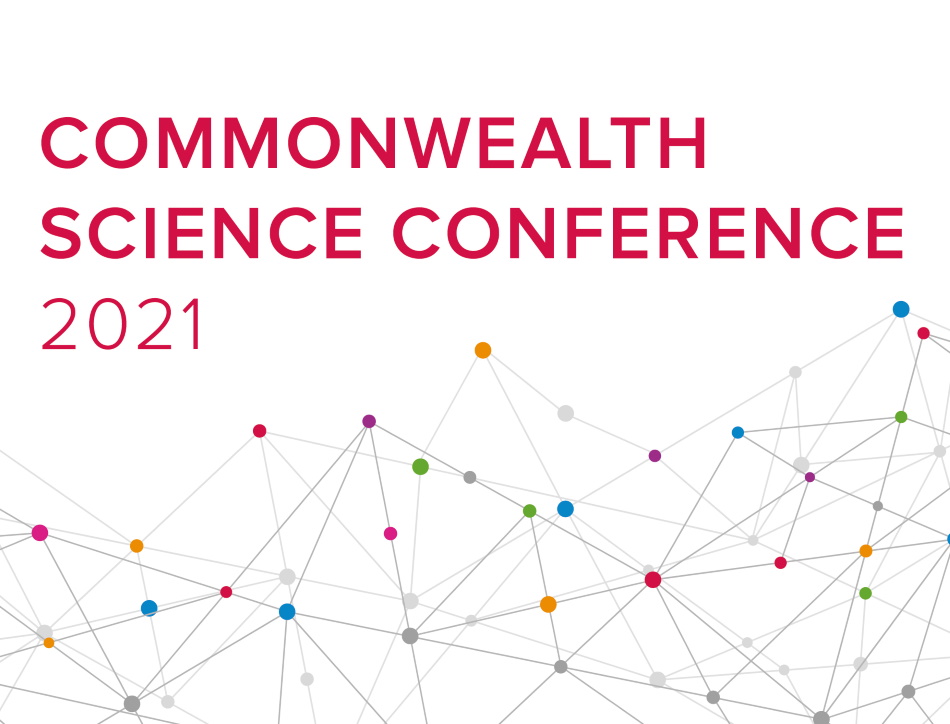Links to external sources may no longer work as intended. The content may not represent the latest thinking in this area or the Society’s current position on the topic.
Day 2 highlights - 2021 Commonwealth Science Conference: Science for a resilient future

The third Commonwealth Science Conference will take place virtually from 22-26 February 2021, co-organised by the Royal Society and the African Academy of Sciences. The conference is funded via the UK government’s Global Challenges Research Fund (GCRF), part of the UK’s Official Development Assistance (ODA).
The theme of the conference will be “Science for a resilient future”, with three main sub-themes:
- Developing resilient energy systems – climate resilient infrastructure; decarbonising energy systems; and a circular economy for the Commonwealth
- Nurturing resilient ecosystems – challenges and opportunities for the blue economy; trajectories, challenges and solutions for biodiversity; and adaptation and mitigation challenges for coastal states in the era of climate change
- Building resilient societal systems – pandemic preparedness before and after Covid-19; climate change adaptation and disaster risk reduction; and a ‘just transition’ to a sustainable Commonwealth
Day 2 highlights include keynote talks and panel discussions:
- Paul Dickinson, Executive Chair at the Carbon Disclosure Project (CDP) on Looking at climate change from a Social Science perspective
- Dr Kelly Chibale, Professor of Organic Chemistry at the University of Cape Town on the H3D Story: Entrepreneurship in science while addressing unmet medical needs in Africa
- Professor Julie Makani, Fellow, Tanzania Academy of Sciences and Royal Society Africa Award 2011 on Can Genomics Improve Health in Africa? Establishing Gene Therapy for Sickle Cell Disease in Tanzania
- Laureate Professor Peter Doherty at the University of Melbourne on The impact of the pandemic on science
Attending this event
- The event will be livestreamed on the Royal Society YouTube channel on Wednesday 24 February 2021 at 6pm GMT
- The event is free to join, and there is no registration required
- Live subtitles will be available
For all enquiries, please contact csc@royalsociety.org
Abstracts
Looking at climate change from a Social Science perspective
Paul Dickinson, Executive Chair, Carbon Disclosure Project (CDP), UK
For over thirty years scientists have issued ever more grave warnings regarding the risks presented by accelerating climate change driven by greenhouse gas emissions from human industry. This talk explains that resolution of these problems will require attention to social science issues as well as atmospheric science. This talk encourages the audience to consider the global business system, both large corporations and investors, as political actors in society. The talk explains how corporations can be supported to evolve rational action in response to global risk.
The H3D Story: Entrepreneurship in science while addressing unmet medical needs in Africa
Professor Kelly Chibale, Neville Isdell Chair in African-centric Drug Discovery and Development, University of Cape Town, South Africa
Gaps in scientific infrastructure, enabling technology platforms and a critical mass of skilled scientists have hampered African-led health innovation. Unless these gaps are addressed, Africa will not be able to build resilient societal health systems and will always be reliant on external partners to address the continent’s health challenges. This will in turn also make it extremely challenging to effectively respond to new pandemics.
On the other hand, entrepreneurship in science is rarely encouraged and incentivized in Africa. While there are large numbers of African scientists graduating, as well as a large number that forms part of the African diaspora, supporting scientific entrepreneurship can help move the continent forward in terms of using science for development, including creating jobs. Therefore, there is a strong need to find sustainable solutions that embed entrepreneurship in African-led health innovation strategies.
This lecture will describe the journey of H3D, the University of Cape Town Drug Discovery and Development Centre, in the development of world-class scientific infrastructure and enabling technology platforms for health innovation. Entrepreneurship in science and initiatives aimed at building a critical mass of skilled scientists across the continent of Africa in a sustainable manner will also be described.
Can Genomics Improve Health in Africa? Establishing Gene Therapy for Sickle Cell Disease in Tanzania
Professor Julie Makani, Fellow, Tanzania Academy of Sciences; Royal Society Africa Award 2011), Tanzania
Sickle cell disease (SCD) is considered a model disease for genomic research, as it is a single-gene disorder, causing high morbidity and mortality, with limited interventions. The first report of gene therapy to cure SCD was from France in 2017, demonstrating the clinical applicability of genomics to cure disease. The highest public health burden of SCD in the world is in Africa (80% of 300,000 annual births) and there is concern that individuals in Africa not only do not have access to existing public health interventions,but will not likely have access to these new gene-based curative therapies. Therefore, countries in Africa have to develop a strategy to achieve two goals; the first goal is the establishment of health programmes that will provide universal access to effective evidence-based health interventions to all individuals with SCD whilst simultaneously pursuing the second goal; which is to conduct research that will lead to curative interventions using genomics. Tanzania is establishing a national public health programme for SCD and has established a genomic programme, which has successfully conducted one of the first genome-wide association studies in SCD in Africa. Using these two platforms, Tanzania aims to conduct gene therapy trials to cure SCD in Tanzania and use the public health system to make these interventions accessible.
Interview with Nobel Laureate Professor Peter Doherty
Laureate Professor Peter Doherty, The University of Melbourne, Australia
Julie Maxton, Executive Director of the Royal Society, interviews Laureate Professor Peter Doherty, winner of the 1996 Nobel Prize in Physiology of Medicine, on the response of the global scientific community to the Covid-19 pandemic. The interview focuses on the impact of the pandemic on science, what lessons can be drawn from the pandemic, and how early career researchers can most effectively contribute to the fight against Covid.
